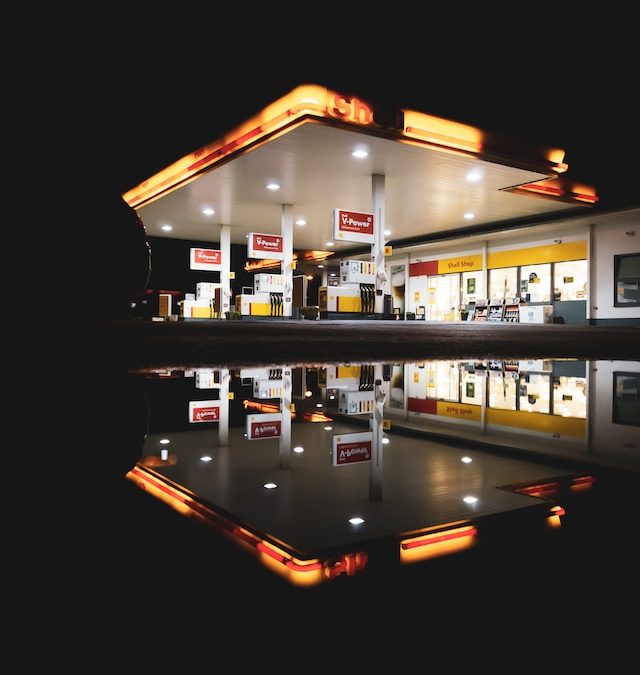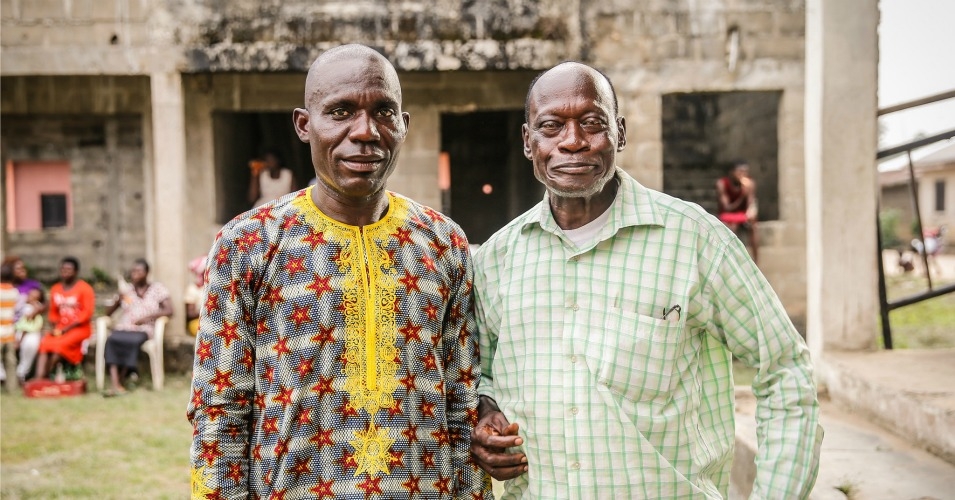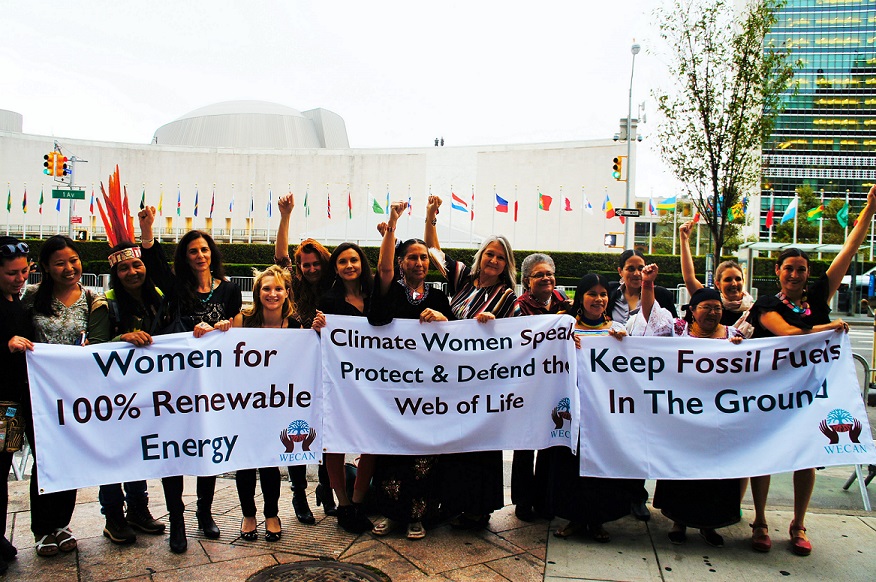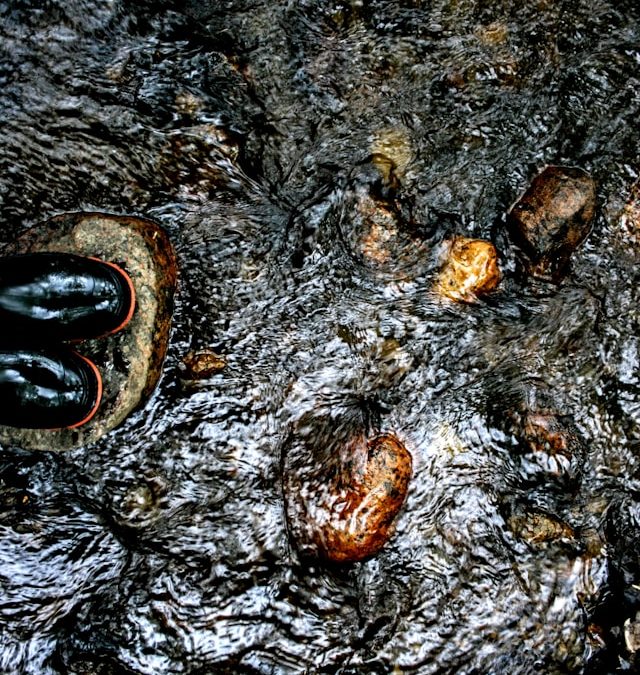
by Deep Green Resistance News Service | Dec 25, 2018 | ANALYSIS, Movement Building & Support
by Max Wilbert / Deep Green Resistance
People often talk about ecological collapse as if it were a distant scenario that might play out in the future, but the reality is that the planet is currently in a state of collapse. This process has been underway for decades.
Perhaps nowhere is this more evident than Nigeria, the most populous nation in Africa and a state still emerging from its legacy as a principal hub of the transcontinental slave trade and decades of British colonial rule.
Although it has long since gained independence, Nigeria has been a virtual oil colony for more than 60 years. Multinational corporations such as Shell and Chevron essentially run the Nigerian government, funding corrupt politicians and military officers to quash all legitimate dissent. Despite the supposed shift to democracy in 1999, Nigeria remains an economic colony run by oligarchs and foreign corporations. Its current president is retired general Muhammadu Buhari, who some locals describe as “Mr. Oil.”[i]
The hardest-hit zone is the oil-rich Niger River Delta, a vast wetland that has been turned into a toxic cesspool by the equivalent of an Exxon-Valdez sized oil spill every single year. Between oil spills, acid rain, and water contamination, the residents of the Niger River Delta are on the front lines of the environmental and capitalist crisis.
In the 1990’s, political opposition to oil extraction in the Niger River Delta became widespread. Much of the resistance was led by women, as Nigeria has a long history of collective women’s action. But the most famous figure of the resistance was Ken Saro-Wiwa, a poet-turned activist who led the Movement for the Survival of the Ogoni people (MOSOP).
In 1995, Nigeria’s ruling military dictatorship arrested Saro-Wiwa along with 8 other leaders of MOSOP on trumped-up charges. They were tried and executed by hanging, and their bodies were dumped into a mass grave. This atrocity marked the end of the non-violent campaign in Nigeria and the beginning of a new phase of struggle.
In the mid-2000’s, a militant group emerged in Nigeria known as the Movement for the Emancipation of the Niger Delta—MEND. Born out of the failure of non-violence, MEND adopted radical new tactics: kidnapping oil workers for ransom, assassinating executives, and sabotaging oil pipelines, tankers, pump stations, offshore platforms, and other infrastructure.
MEND’s tactics have been innovative, using speed, stealth, and intelligence to target their attacks where they will do the most damage. At the height of their operations, MEND disabled a full half of all oil capacity in Nigeria, the largest oil exporting nation in Africa and a member of OPEC. One analyst writes that MEND’s targets have “been accurately selected to completely shut down production and delay/halt repairs.”[ii]
In 2006, MEND militants released a chilling letter reminding the oil companies of their total commitment.
“It must be clear that the Nigerian government cannot protect your workers or assets. Leave our land while you can or die in it,” the group wrote. “Our aim is to totally destroy the capacity of the Nigerian government to export oil.”[iii]
It is difficult for us to imagine the level of courage it takes for people from the Niger River Delta to rise up in the face of nearly impossible odds against Shell’s elite private mercenary armies and the American-trained special forces units of the Nigerian military.
But we must imagine it, and compare this to our own courage, or lack of courage.
Here in the United States, a grossly inequal and destructive society has been built on land stolen from indigenous people. Slaves built the American capitalism which today is maintained by weapons manufacturers, parasitic drug companies, predatory finance and investment banks, a private prison system that differs little from chattel slavery, and a global oil empire that has been built on the bones of the Ogoni people, on the total poisoning of the Gulf of Mexico, and on the tar sands, the largest and most destructive industrial project on Earth.
The signs of what is happening are so clear ignorance is a willful choice. Just a few days ago, the United Nations warned of imminent “ecosystem collapse.” The IPCC has issued warning after warning of the dire consequences of global warming. Plankton populations, the very foundation of oceanic life and the source of most of the world’s oxygen, are collapsing. Insect populations are collapsing. The last fragments of uncut forests around the world are falling to the chainsaw as fascists and militarists like Bolsonaro, Trump, Putin, Jinping, and Duterte sell off every last fragment of the planet to fund their nationalist, militarist dreams. Coral reefs are dying, wetlands are being drained, and rising seas are expected to make 2 billion people into refugees by century’s end.
As our world teeters on the brink of total ecological and social collapse, we have no more excuses. We have all the information and all the inspiration we need. The times are prompting us to exercise our “revolutionary right to dismember or overthrow” the systems that are murdering the planet and trampling human lives.
If we continue to take no action, we are all cowards. There is no other way to explain our inaction.
Max Wilbert is a third-generation organizer who grew up in Seattle’s post-WTO anti-globalization and undoing racism movement, and works with Deep Green Resistance. He is the author of two books.
[i] Nigeria Oil and Gas: An Introduction and Outlook. By Dele Ogun. Oil and Gas IQ. October 16, 2018. https://www.oilandgasiq.com/market-outlook/news/nigeria-oil-and-gas-an-introduction-and-outlook.
[ii] Nigerian Evoluition. Global Guerillas. January 2006. https://globalguerrillas.typepad.com/globalguerrillas/2006/01/nigerian_evolut.html.
[iii] NIGERIA: Shell may pull out of Niger Delta after 17 die in boat raid. By Daniel Howden. Corpwatch. January 17, 2006. https://corpwatch.org/article/nigeria-shell-may-pull-out-niger-delta-after-17-die-boat-raid.
Photo by Justus Menke on Unsplash

by DGR Colorado Plateau | Dec 26, 2015 | Lobbying, Toxification
Featured Image: Alali Efanga & Chief Fidelis Oguru from Oruma, two plaintiffs in the Dutch court case against Shell. (Photo: Milieudefensie/flickr)
In a potentially precedent-setting ruling, a Dutch court said Friday that Royal Dutch Shell may be held liable for oil spills at its subsidiary in Nigeria—a win for farmers and environmentalists attempting to hold the oil giant accountable for leaks, spills, and widespread pollution.
The ruling by the Court of Appeals in the Hague, which overturns a 2013 decision in favor of Shell, allows four Nigerian farmers to jointly sue the fossil fuels corporation in the Netherlands for causing extensive oil spills in Nigeria.
The scars of those disasters are still visible in the fields and fishing ponds of three Nigerian villages. In one village, drinking water has been rendered non-potable, while in another, an entire mangrove forest has been destroyed.
Alali Efanga, one of the Nigerian farmers who, along with Friends of the Earth Netherlands, brought the case against Shell, said the ruling “offers hope that Shell will finally begin to restore the soil around my village so that I will once again be able to take up farming and fishing on my own land.”
Beyond that, the court’s decision “is a landslide victory for environmentalists and these four brave Nigerian farmers who, for more than seven years, have had the courage to take on one of the most powerful companies in the world,” said Geert Ritsema, campaigner at Friends of the Earth Netherlands. “This ruling is a ray of hope for other victims of environmental degradation, human rights violations, and other misconduct by large corporations.”
Indeed, as Amnesty International researcher Mark Dummett said in advance of the ruling: “This case is especially important as it could pave the way for further cases from other communities devastated by Shell’s negligence.”
“There have been thousands of spills from Shell’s pipelines since the company started pumping oil in the Niger Delta in 1958,” Dummett said, “with devastating consequences for the people living there.”
Decrying the “incredible levels of pollution” caused by the activities of Shell and its subsidiaries, environmentalists Vandana Shiva and Nnimmo Bassey said at a media briefing in July that “weekends in Ogoniland are marked by carnivals of funerals of people in their 20s and 30s.”
Citing a 2011 United Nations Environmental Programme assessment, they noted that in over 40 locations tested in Ogoniland, the soil is polluted with hydrocarbons up to a depth of 5 meters and that all the water bodies in the region are polluted.
The UN report, they said, also found that in some places the water was polluted with benzene, a known carcinogen, at levels 900 above World Health Organization standards. “With life expectancy standing at about 41 years, the clean up of Ogoniland is projected to require a cumulative 30 years to clean both the land and water,” they said.
In another historic victory for the plaintiffs, the Hague court on Friday also ordered Shell to give the farmers and environmental activists supporting their case access to internal documents that the court said could shed more light on the case.
Channa Samkalden, counsel for the farmers and Friends of the Earth, said it was “the first time in legal history that access to internal company documents was obtained in court…This finally allows the case to be considered on its merits.”
The court will continue to hear the case in March 2016.
This work is licensed under a Creative Commons Attribution-Share Alike 3.0 License

by DGR Colorado Plateau | Oct 11, 2015 | Climate Change, Lobbying, Protests & Symbolic Acts, Women & Radical Feminism
SAN FRANCISCO– On Tuesday, September 29th, 2015 women from fifty countries around the world took action for climate justice, gender equality, bold climate policies and transformative solutions as part of the Global Women’s Climate Justice Day of Action organized by the Women’s Earth and Climate Action Network (WECAN International).
From Sudan to the Philippines, from Ecuador to France, women raised their voices collectively to show resistance to social and environmental injustice and to present their solutions and demands for a healthy, livable planet.
In Port Harcourt, Nigeria women organized the ‘African Women Uniting for Energy, Food, & Climate Justice Exchange’, during which they shared struggles and solutions around oil extraction in the Niger delta and led a march through the city. In Swaziland, women united to sign the Women’s Climate Declaration and dialogue about why women experience disproportionate climate impacts and what can be done to address this injustice.
In Scotland, women collected trash from the beach and ocean to create an art installation highlighting the plight of threatened Arctic ecosystems. In Odisha, India, women united to speak out against deforestation fueled by the mining industry, taking direct action by planting trees and writing a memorandum to local government officials calling for communitywide reforestation programs led by women. Many worldwide participants voiced their demands for their governments to keep fossil fuels in the ground and immediately finance a just transition to 100% renewable energy.
Action recaps, photos, and statements from worldwide participants have been compiled on a central Day of Action gallery, from which they are being shared and amplified across the globe.
While women held decentralized actions in their communities, WECAN International convened a September 29th hub event, ‘Women Speak: Climate Justice on the Road to Paris & Beyond’ at the United Nations Church Center in New York City, directly across the street from where world leaders gathered for the annual United Nations General Assembly.
The event featured presentations and declarations of action by outstanding leaders including Indigenous activist and Greenpeace Canada campaigner Melina Laboucan-Massismo, May Boeve of 350.org, Jacqui Patterson of the NAACP, Patricia Gualinga, Kichwa leader of Sarayaku Ecuador, Thilmeeza Hussein of Voice of Women Maldives, and a special video message from Mary Robinson, former President of Ireland and President of the Mary Robinson Foundation-Climate Justice. The event concluded with a historic announcement and presentation of the ‘Indigenous Women of the North and South – Defend Mother Earth Treaty Compact 2015’.
As the day drew to a close, WECAN International and allies united for a direct action outside of the United Nations Headquarters.
“Women around the world are well aware that what is happening in the ‘halls of power’ is not nearly enough given the degree of climate crisis that we face and the injustices and impacts felt by women on the frontlines across the globe,” explained Osprey Orielle Lake, Founder and Executive Director of the Women’s Earth and Climate Action Network, “On September 29th, women across the world mobilized for bold, transformative climate change solutions and demonstrated the strength, diversity, and vitality of the women’s movement for climate justice. Women have always been on the frontlines of climate change, and now we are taking action to make sure that our voices and decision-making power are at the forefront as well. The stories, struggles, and solutions shared as part of the Global Women’s Climate Justice Day of Action will be carried forward to COP21 in Paris and beyond.”
***
The Women’s Earth and Climate Action Network (WECAN International) is a solutions-based, multi-faceted effort established to engage women worldwide as powerful stakeholders in climate change, climate justice, and sustainability solutions. Recent work includes the 2013 International Women’s Earth and Climate Summit, Women’s Climate Declaration, and WECAN Women’s Climate Action Agenda. International climate advocacy is complemented with on-the-ground programs such as the Women’s for Forests and Fossil Fuel/Mining/Mega Dam Resistance, US Women’s Climate Justice Initiative, and Regional Climate Solutions Trainings in the Middle East North Africa region, Latin America, and Democratic Republic of Congo. WECAN International was founded in 2013 as a project of the 501(c)3Women’s Earth and Climate Caucus (WECC) organization and its partner eraGlobal Alliance.
www.wecaninternational.org
@WECAN_INTL

by Deep Green Resistance News Service | Apr 23, 2012 | Mining & Drilling, NEWS, Toxification
By Amnesty International
A major oil spill in the Niger Delta was far worse than Shell previously admitted, according to an independent assessment obtained by Amnesty International and the Centre for Environment, Human Rights and Development (CEHRD), which exposes how the oil giant dramatically under-estimated the quantities involved.
The spill in 2008, caused by a fault in a Shell pipeline, resulted in tens of thousands of barrels of oil polluting the land and creek surrounding Bodo, a Niger Delta town of some 69,000 people.
The previously unpublished assessment, carried out by US firm Accufacts, found that between 1,440 and 4,320 barrels of oil were flooding the Bodo area each day following the leak. The Nigerian regulators have confirmed that the spill lasted for 72 days.
Shell’s official investigation report claims only 1,640 barrels of oil were spilt in total. But based on the independent assessment the total amount of oil spilt over the 72 day period is between 103,000 barrels and 311,000 barrels.
Audrey Gaughran, Director of Global Issues at Amnesty International, said:
“The difference is staggering: even using the lower end of the Accufacts estimate, the volume of oil spilt at Bodo was more than 60 times the volume Shell has repeatedly claimed leaked.
“Even if we use the start date given by Shell, the volume of oil spilt is far greater than Shell recorded.”
Shell’s oil spill investigation report also claims that the spill started on 5 October 2008 – while the community and Nigerian regulators have confirmed a start date of 28 August 2008.
What is not in dispute is that Shell did not stop the spill until 7 November – four weeks after it claims it began – and 10 weeks after the start date given by the community and the regulator.
Converting the amount into litres, Shell’s figure is just over 260,000 litres, while the lowest estimate based on the Accufacts assessment, and using Shell’s start date, would be 7.8 million litres.
However, using the start date given by the community and regulator and the higher end of the estimate, then it is possible that as much as over 49 million litres of oil spilt at Bodo.
The publication of the independent assessment coincides with a global week of action in which people from across the world are calling on Shell to stop hiding from the devastating impact of its operations in the Niger Delta on people’s lives and the environment.
The serious under-recording at Bodo also has wider implications: Shell repeatedly claims to its investors, customers and the media that the majority of the oil spilt in the Niger Delta is caused by sabotage.
The basis for this claim is the oil spill investigation process, which is deeply flawed and lacks credibility. The cause of spills, the volume of oil spilt, and other important parameters like the start date, are not recorded in any credible way.
Bodo is one example but Amnesty International and CEHRD have also exposed serious failings in other oil spill investigations.
Both organisations have repeatedly called for an independent process for investigation of oil spills, and an end to the system that allows oil companies to have such influence over the process.
Shell initially claimed to the media that 85 per cent of oil spilt in the Niger Delta in 2008 was caused by sabotage. The company later admitted that this figure did not include a major oil spill that was subsequently found to be due to operational failures.
Based on the new evidence obtained by Amnesty International and CEHRD about the 2008 Bodo oil spill more than half of the oil spilt in the Niger Delta in 2008 was due to operational failures – and possibly as much as 80 per cent. However, given the serious flaws in the oil spill investigation process, all oil spills would have to be subjected to independent assessment to obtain accurate figures.
Audrey Gaughran said:
“Sabotage is a real and serious problem in the Niger Delta, but Shell misuses the issue as a PR shield and makes claims that simply don’t stand up to scrutiny.”
More than three years after the Bodo oil spill, Shell has yet to conduct a proper clean up or to pay any official compensation to the affected communities. After years of trying to seek justice in Nigeria the people of Bodo have now taken their claim to the UK courts.
Patrick Naagbanton, Coordinator of CEHRD, added:
“The evidence of Shell’s bad practice in the Niger Delta is mounting. Shell seems more interested in conducting a PR operation than a clean-up operation. The problem is not going away; and sadly neither is the misery for the people of Bodo.”
This week thousands of activists in more than 14 countries – from Japan to Sweden, Senegal to the USA, as well as in Shell’s home countries the Netherlands and the United Kingdom – are taking part in events and protests, including outside Shell’s offices and petrol stations, calling on Shell to clean up its act in the Niger Delta.
Amnesty International is also running an online petition calling on Shell’s Chief Executive Peter Vosser to act.
The week will reach a climax when affected communities stage a peaceful demonstration outside Shell’s offices in Port Harcourt in the Niger Delta.
From Amnesty International
Photo by Ellie Storms on Unsplash
by Deep Green Resistance News Service | Apr 14, 2012 | Property & Material Destruction
By Valentina Za and Joe Brock / Reuters
A crude oil pipeline owned by Italian oil and gas group Eni was attacked on Friday in Nigeria’s onshore Niger Delta and a militant group claimed the strike.
Attacks in the restive region have been fewer since an amnesty for militants in 2009, although large-scale oil theft and sporadic pipeline sabotage still occurs.
“We can confirm a pipeline, leading to Tebidaba, in the Clough-Creek area has been attacked,” an Eni spokeswoman said.
Eni’s unit Agip owns the Tebidaba-Brass pipeline, which has been subject to several attacks in recent years.
The Movement for the Emancipation of the Niger Delta (MEND), which was the main militant group prior to the amnesty, claimed Friday’s attack and warned of more to come.
“At 0210 fighters of MEND attacked and destroyed one wellhead and one manifold on trunk lines belonging to Agip … more attacks to follow,” a statement e-mailed to reporters said.
MEND has been largely inactive since most of its militants agreed an amnesty with the government in 2009, ending a wave of attacks that at one stage cut oil production down by half.
Under the amnesty thousands of militants gave up their weapons, joined training schemes and drew stipends. Security sources say remaining gangs in the Niger Delta do not have the capacity to do the damage seen in the past.
But a resurgence of militant activity is an unwelcome headache to President Goodluck Jonathan’s administration, whose security forces are already stretched by an Islamist insurgency raging in the north.
From Reuters: http://www.reuters.com/article/2012/04/13/eni-attack-nigeria-idUSL6E8FD19Z20120413




